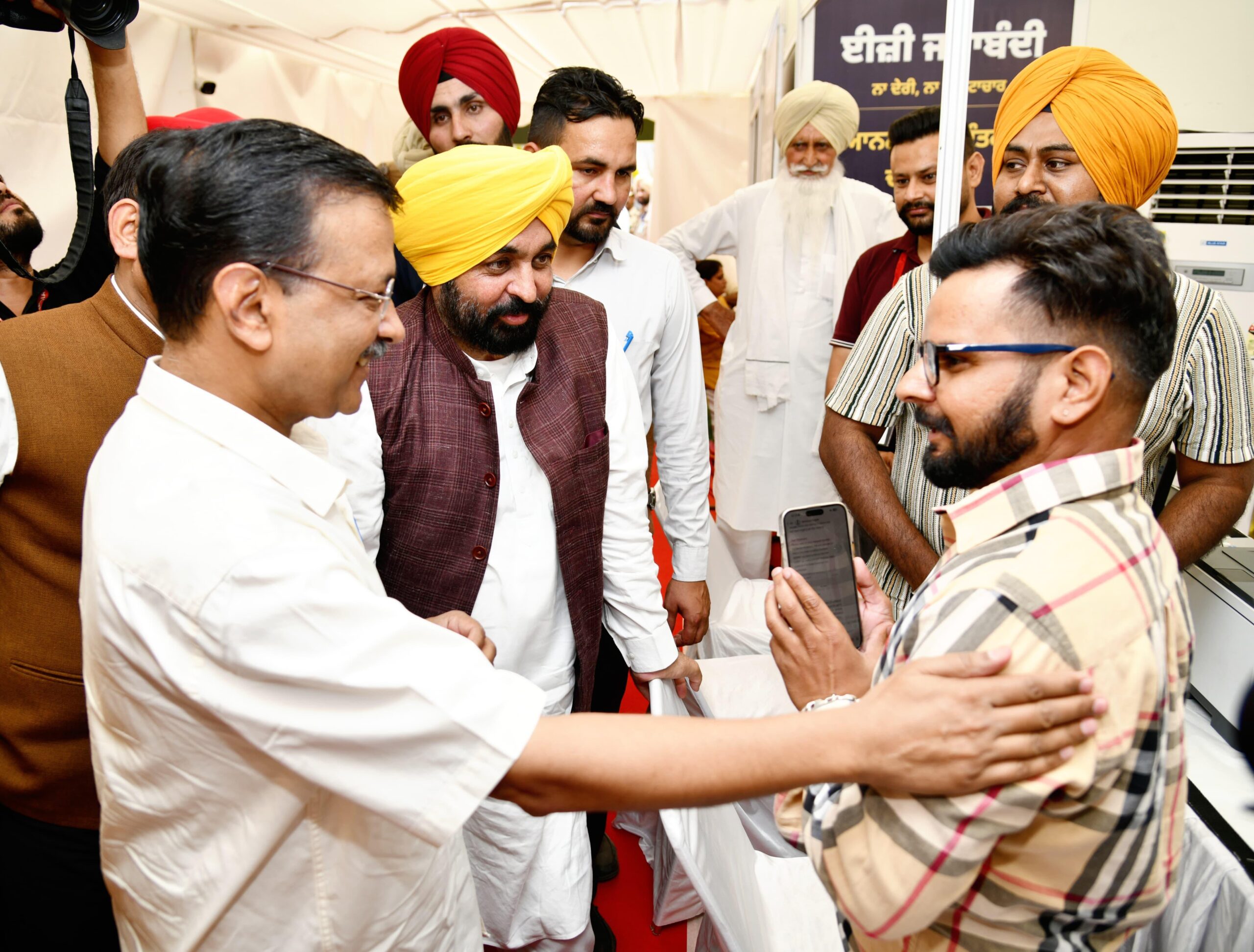In a decisive move to eradicate corruption and bureaucratic delays from land-related services, AAP National Convenor Arvind Kejriwal and Punjab Chief Minister Bhagwant Mann on Thursday launched the Easy Jamabandi portal—easyjamabandi.punjab.gov.in—ushering in what the AAP Chief called a new era of transparency and convenience in property governance. With this reform, services like Jamabandi, mutation, fard, and rapat entry can now be accessed online—eliminating the long-standing grip of middlemen, touts, and bribery at the tehsil level.
WhatsApp delivery of Jamabandi documents is now a reality, while the success of Easy Registry in Mohali has paved the way for state-wide rollout—starting 15 July, citizens will be able to register property from the comfort of their homes. “No more chaos, no more corruption—every land-related task in Punjab is now just one click away,” declared Arvind Kejriwal.
Launching the Easy-Jamabandi Portal in Punjab on Thursday, AAP National Convenor Arvind Kejriwal said, “What we are starting in Punjab today is no less than a revolution. In the past one or two months, so many works have been done one after the other that it is nothing short of a revolution.”
Highlighting the daily harassment faced by common people, he said, “The common individual has to run around tehsildars and patwaris, take leave from work, miss their job, pay bribes—and even then, the work doesn’t get done. Sardar Bhagat Singh had said that the purpose of our freedom movement was not to replace white rulers with black rulers. But that is what happened. He had not imagined this kind of India. He wanted real freedom—freedom where people of this country could breathe in peace.”
The AAP Supremo added, “The kind of work we are doing in Punjab today should have been done 75 years ago, in 1950 or 1955. Even today, our people are treated like slaves by tehsildars and patwaris. But now, this work has given people a new kind of freedom. You don’t need to visit government offices anymore—farm freely, run your business in peace, spend happy moments with your family.”
Speaking about registry reforms, Arvind Kejriwal said, “The most bribery in government offices happens in the land registry. It was impossible to get your registry done without paying money or a bribe. So we decided to fix this first. In Mohali, even the deed-signing process has been simplified. Earlier, a deed writer would trap people, acted as a broker, and had ‘setting’ at every table. Now, we’ve built excellent air-conditioned offices in seven tehsils of Mohali where there are no agents. You go to the government office, and your deed is written directly by the staff—no need to go to a deed writer.”
He continued, “In fact, now people don’t even need to go to an office. You can write your deed online sitting at home. CM Bhagwant Mann had this brilliant idea—he said that these deeds are written in complicated Urdu that people don’t understand. So we got them translated into Punjabi and simplified them so that a common person can write it themselves.”
Explaining the simplified process, the AAP Chief said, “Write the deed, upload it, make the payment online. You’ll get a message saying—come on this date to get your photograph clicked. It takes five minutes, and you get your deed. Earlier, people used to run around for months, pay agents, suffer abuse. Now, all that is over. The entire registry process now takes just 20 minutes.”
Speaking about the pilot in Mohali, he said, “We started it in Mohali to see if there were any problems. It’s been a month—there hasn’t been a single issue. There’s no scope left for bribery. From July 15, this will be launched across Punjab.”
Arvind Kejriwal added, “There is no need to go to a deed writer anymore. Write your own deed—fill just four or five fields: seller, buyer, land address, and sale price. That’s all. We met a person whose father passed away in 2012. He had been going around for 13 years, but the mutation never happened. Now, the same work was done in just two days—he filed it online from home and it was completed. No office visits, no agents, no tehsildar, no patwari.”
Announcing a major digital leap, Arvind Kejriwal said, “Today we are launching five new services: Jamabandi will now come on WhatsApp. Mutation, fard, rapat entry—any change that you want to make in land records, you can now do online.”
Sharing a major relief for NRIs, he said, “During the election campaign, many people said that NRIs are very troubled. They have property in their village—land, houses—but when they go abroad, someone grabs it. Then the encroachers use their setting with the patwari and tehsildar to change the documents. The NRI keeps running around courts and never gets their property back.”
He added, “Now people can subscribe to their property for just ₹500. If someone tampers with your records, you’ll get an instant message. You can immediately file an objection and stop the process. This is a huge service. Lakhs of people will benefit.”
Highlighting improvements in service delivery, Arvind Kejriwal said, “When our government was formed in Punjab, 28% of applications in Sewa Kendras were pending. Now only 1% are pending—everything else is done. Last year, we made death certificates, caste certificates, and birth certificates all available online. Very soon, patwar offices will be locked.”
He added, “In other states, leaders cut ribbons to open new offices. Here, we are removing the need to ever visit one. Gradually, all departments—transport, revenue, and more—are going online. People won’t have to go to offices. No need for agents.”
Reaffirming his government’s commitment to Bhagat Singh’s vision, Arvind Kejriwal said, “Sardar Bhagat Singh gave his life so that people in this country could live in peace and freedom. Our citizens should not have to spend their lives running around tehsildars, patwaris, revenue and transport departments.”
Responding to questions about infrastructure delays, he said, “Yes, some road works are paused because of rains. But from September–October, we will begin construction of 19,000 kilometres of rural roads. This scale of construction has never happened in Punjab before.”
He added, “These roads will be of top quality. For the first time, every road contractor will be bound by a 5-year guarantee. If the road breaks, the contractor must fix it for free. This will end corruption in road construction.”
Arvind Kejriwal also addressed the issue of blue ration cards: “When our government was formed, some people engaged in wrongdoing and had lakhs of blue cards cancelled. But all those cards have now been reinstated. CM Bhagwant Mann is sending letters to everyone whose card has been restored—asking them to resume collecting their ration.”
AAP Government’s Top Priority is to End Corruption & Exploitation in Tehsils: CM Bhagwant Mann
Punjab Chief Minister Bhagwant Mann on Thursday reaffirmed that eliminating exploitation and corruption in tehsils is a top priority of the AAP government. “The moment a common person steps into a tehsil, they are gripped by fear and are forced to pay bribes at every step. People waste time and money, repeatedly visiting tehsils, yet their work remains unfinished. The new ‘Easy Jamabandi Portal’ will end this harassment once and for all,” Bhagwant Mann declared.
He explained that the portal will now enable citizens to access services such as jamabandi, intkal, and fard badar from the comfort of their homes using a mobile phone or laptop. “This is a revolutionary step to eliminate corruption at its roots. Applications will now go directly to the patwari’s login. If the task isn’t completed within 15 days, the Deputy Commissioner will be held accountable. A dedicated link for filing bribery complaints is available on the portal, and strict action will be taken against guilty officials,” he said. Bhagwant Mann added that citizens will receive updates at every stage via WhatsApp, eliminating the need for physical visits to tehsils.
Highlighting the digital readiness of Punjab, the Punjab CM noted, “Punjab has more mobile phones than its total population, and the majority use smartphones. This portal will be a gamechanger.” Recalling a real-life example, he spoke about a man who had been running from pillar to post for 13 years to transfer land after his father’s death. “His beard turned grey, but his work didn’t get done. Now, with this portal, the work was completed in just two days.”
He criticised the previously entrenched culture of bribery: “In the old system, work would only proceed if bribes reached the top. This entire corrupt chain will now be dismantled.” Mann also announced that the pilot project for online property registration in Mohali had been a success and would be rolled out across Punjab from July 15. “Citizens will be able to draft their registry documents at home. If no objection is raised within seven days, the registry will be processed. People will no longer be restricted to their own tehsils—they can register in any tehsil of any district. This will reduce congestion and curtail corruption,” he said.
Bhagwant Mann stressed that this transparency will also enable the government to monitor which tehsils are underperforming or which officers are engaging in malpractice. “If a tehsildar is found indulging in wrongdoing, swift action or transfer will follow.”
Calling for systemic reform, Bhagwant Mann asserted, “You cannot clean up a rotten system by simply transferring a patwari. That’s just shifting garbage from one place to another. The entire structure needs to be rebuilt.” He announced plans to shut down existing patwar khanas by August and inaugurate new ones functioning entirely through online systems. “With drone-based land mapping, online intkals, and digital registries, the need for patwaris has significantly decreased. However, no government employee will lose their job—they will be reassigned to other departments like Revenue, GST, or Irrigation,” he clarified.
Bhagwant Mann urged citizens to actively report corruption and help reform tehsils into citizen-friendly institutions. “The red-brick tehsil buildings have become symbols of corruption. We will build new tehsils with proper waiting areas, clean water, and sanitation facilities, where citizens are treated with dignity.”




